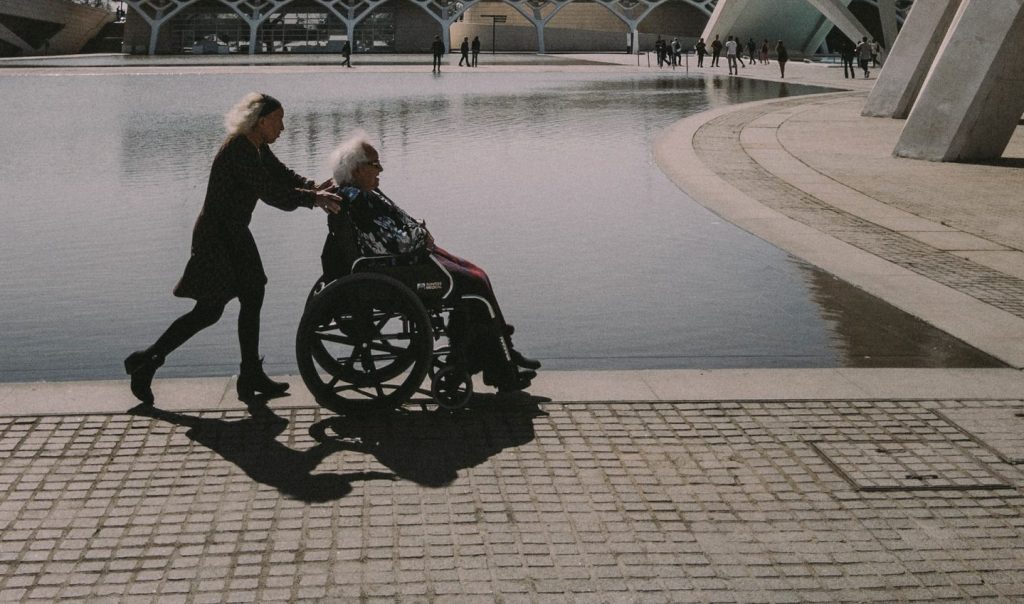Unpaid carers are barely supported in Wales and it’s time they’re protected from the injustice of poverty, argues Rachel Cable.
You’d be forgiven for not knowing that today marks Carers Rights Day.
Amid all of the continuing coronavirus chaos, this important date for Wales’ unpaid carers has slipped down political leaders’ priority lists. So too, has the increasingly precarious predicament that people who look after sick or disabled loved ones are finding themselves in, thanks to Covid.
This Carers Rights Day, we must acknowledge and address the fact that across Wales, more and more unpaid carers; the invisible glue holding our nation together; are standing on the precipice of poverty.
Regrettably, despite the well documented connection between caring and poverty, the Welsh Government’s proposed new national plan for carers makes virtually no mention of the financial hardship unpaid carers face.
It’s an unacceptable omission. Even before Covid-19, carers in Wales were more likely to live in poverty; often forced to give up work in order to carry out 24/7 caring responsibilities, left to rely on an inadequate social security system which lets all too many people down. As a result, some unpaid carers were already being forced to turn to food banks and pay day lenders.
“This unequal distribution of care, as well as the under-valuing of it, impacts women throughout their lives.”
The coronavirus simply made a bad situation worse. Research by Carers Wales shows that three quarters of unpaid carers reported that their costs went up during the first lockdown; extra money people simply didn’t have. Clearly, the last thing that any unpaid carer needs to be worrying about is how to pay the bills and put food on the table.
We’re not talking about a small group of people, either. The Welsh Government’s own figures show that in Wales more than 370,000 unpaid carers of all ages provide care; a figure expected to increase to half a million by 2037.
And these caring responsibilities are far from equally shared; here in Wales as is true around the world, women do almost all of the heavy lifting in unpaid care roles.
This unequal distribution of care, as well as the under-valuing of it, impacts women throughout their lives. It perpetuates gender and economic inequalities, undermines their health and wellbeing, limits their economic prosperity, fuels gender gaps in employment and wages and amplifies existing vulnerabilities.
Women have less time to pursue paid work and career progression; making them more likely to have part-time or precarious work, earn less, and be more likely to live in poverty and be poorer as they get older.
“Their contribution to Wales’ pandemic response cannot become a footnote of history; it must be a catalyst for change.”
These grim realities make it increasingly urgent for the Welsh Government to turn its warm words about Wales’ carers into concrete action, delivered via its new national plan for carers.
Yes, there have been welcome gestures, including the creation of the Carers’ Hardship Fund worth £1 million. But what happens when that money inevitably dries up?
If Wales’ unpaid carers are going to be protected from poverty, then we need to see a step change in the way that they are valued. After all, the efforts of Wales’ unpaid carers are the hidden engine that drives our economy; their quiet, selfless contributions are worth around £8.1 billion each year.
It’s clear there’s a yawning need for Wales’ national plan for carers and the associated carers’ charter to prioritise ensuring that poverty is never the consequence of caring.
The Welsh Government’s proposal to include in its national plan measures aimed at helping carers stay in work is a step in the right direction. Nearly 75,000 people in Wales have had to reduce their hours at work in order to juggle their caring responsibilities; twice that number have had to give up work entirely.
While employment rights are reserved to Westminster, the Welsh Government has a significant role to play, in partnership with businesses, in ensuring that paid work provides a reliable route out of poverty for carers.
The Government’s national plan should outline clear expectations on employers to provide a supportive environment as part of its commitment to ‘Fair Work’, commit to bolstering voluntary accreditation schemes and make access to public funds conditional on progress to achieve this.
Making carers the visible and valued engine of a new wellbeing economy in Wales also requires more money to be invested. A dedicated social care levy in Wales – focused on taxing high incomes or wealth – could help fund a transformation in the way we value and fund the social care system, while generating the resource needed to protect unpaid carers from poverty.
Unpaid carers need our solidarity more now than ever before. Their contribution to Wales’ pandemic response cannot become a footnote of history; it must be a catalyst for change.
The Welsh Government’s national plan for carers must ensure that carers are protected from the injustice of poverty and outline clear, measurable steps that will make care count in Wales.
All articles published on the welsh agenda are subject to IWA’s disclaimer.
Photo by Eugene Chystiakov on Unsplash





